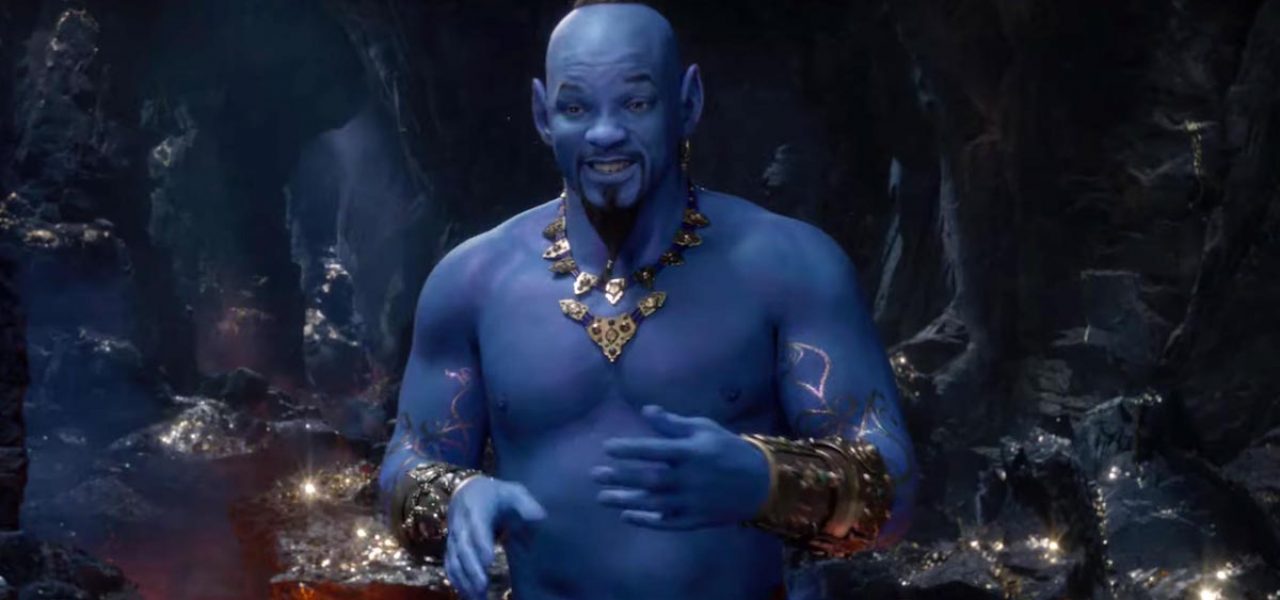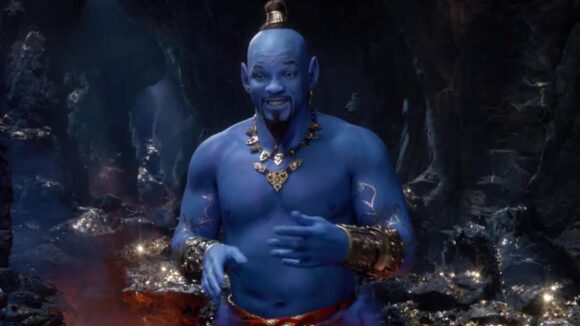

‘Aladdin’ Reviews Are Mixed — But Far Less Catastrophic Than Originally Expected
Based on the 1992 animated feature, Disney’s latest cg/live-action hybrid remake Aladdin is among their most expensive ventures in the company’s current trend to revamp its vintage animation titles. Though initial negative reactions, mostly towards Will Smith’s version of the Genie, loomed over the production, reviews have been far less catastrophic than expected, which bodes well for its Memorial Day weekend release. The movie currently holds a 58% rating on Rotten Tomatoes with 126 “fresh” reviews and 90 “rotten” ones.
Disney’s loyal fandom, comprised of millennials who remember the original and are curious to see this new take, has already shown its numbers bringing in $7 million from Thursday night preview screenings of the film. Analysts estimate Aladdin will gross somewhere between $75-$85 million for its four-day U.S. opening in over 4,400 locations. Aladdin will easily take the no.1 spot at the box office dethroning last week’s highest grosser John Wick: Chapter 3 – Parabellum.
The film also debuts internationally this week in nearly all major markets including France, Italy, U.K., Germany, Russia, Australia, Korea, Brazil, China, Mexico, and Spain. It will open in Japan on June 7.
Animation and vfx in Aladdin were created by Industrial Light & Magic, Hybride, One of Us, DNEG Stereo, Nvizage, and Proof, with Chas Jarrett serving as production vfx supervisor. With an estimated $183 million budget, this new remake is one of the most expensive Disney has released to date. The price tag was $160 million for 2017’s Beauty and the Beast, $165 million for 2016’s The Jungle Book, and $170 million for this year’s Dumbo.
It’s important to remember that the animation artists and writers who created the Disney characters and stories aren’t receiving any compensation for their efforts, which are the foundation for these remakes. Although it’s all legal, this serves as an example of the way the film industry treats animation creators. Last year, Terry Rossio, one of the writers of the original animated feature, took to Twitter to speak out about being excluded both financially and creatively from the upcoming live-action Disney remake, which uses stories and scenes that he helped to create.
Directed by British filmmaker Guy Ritchie, better known for his action-packed crime sagas than family-friendly fare, the new Aladdin stars Will Smith as the beloved Genie once voiced by the late Robin Williams, as well as young actors Mena Massoud (Aladdin), Naomi Scott (Jasmine), and Marwan Kenzari (Jafar).
Upon the release of the first teaser trailer, Ritchie’s production was on the receiving end of negative reactions from fans and the press targeted the depiction of the Genie. Images of a cg-enhanced Smith sporting blue skin were mocked on Twitter with most reacting in disbelief to Disney’s approach to the character. Based on those first impressions, critics were preparing for the end result to be a disaster, but now that reviews have dropped, positive takes are in the majority.
Most critics praised the fact that Alan Menken’s songs remained intact and that the movie actually benefits from expansion of the story in this version giving more depth to Jasmine and Jafar. One major point nearly everyone makes is how Will Smith’s performance can’t rival what Williams did with the original animated Genie, brilliantly brought to life by animator Eric Goldberg. Still, several critics commended the actor for giving the character his own unique touch.
Here are some takes on the film from critics at major publications:
Justin Chang of The Los Angeles Times was generally positive about the hybrid remake, but noted the animated Genie is still unchallenged:
The Genie, of course, was the original movie’s manically entertaining raison d’être, and he was also the source of much of the early concern swirling around the remake. It was clear that no one could match the gale-force comic impact of Robin Williams, whose dazzling bursts of vaudevillian lunacy and his ability to shift from one goofy persona to the next were ideally suited to the speed and dexterity of hand-drawn animation. Finally, here was a medium that could keep pace with him.
Writing for Time Out, Joseph Walsh felt Smith succeeded at capturing the Genie’s essence despite the blue-colored skin:
Then there’s Genie. Stepping into Robin Williams’s shoes was always going to be an unenviable task. Early photos of a blue-skinned Will Smith (and that ponytail) were met with cries of horror. Smith is at his best when he makes the role his own, but he never quite captures the magic that made us fall in love with Genie the first time around.
For The Wrap, William Bibbiani reminisced about what the original film meant for the animation medium:
The original Aladdin was an innovative motion picture, heralding a new era of CG-assisted animation and celebrity stunt-casting. It was bold and exciting. The remake rehashes the original in a pleasing but perfunctory way: It’s extremely satisfying to see these roles finally filled by non-white actors, but the movie still feels like a wholly western interpretation of one of the tales from One Thousand and One Nights.
In his review for New York Times, A.O. Scott explained the new Aladdin is not terrible, but also unnecessary:
Aladdin, the 1992 cartoon feature with Robin Williams as a garrulous blue genie, may not be the best movie from Disney’s second golden age of animation, but like the others it has durable charms and memorable songs. Aladdin, the new live-action re-whatever with a blue Will Smith popping out of the lamp, may not be the worst product of the current era of legacy intellectual property exploitation (it’s likely that the worst is yet to come), but like most of the others it invites a simple question: Why?
For Entertainment Weekly, Chris Nashawaty was also not completely displeased with the film, but questioned the greed behind its existence.
[T]he new Aladdin is hardly the folly that the advance bad buzz prepared us for. The candy-colored costumes and production design are stunning, Alan Menken’s songs are as infectious as ever, the dance numbers have an electric Bollywood flair, and some of the bazaar chase sequences have a Young Indiana Jones sense of rollicking, Rube Goldberg fun. But mostly it all feels too dutiful, too familiar. This is where we are in 2019. The ever-quickening half-life of pop culture has gotten so short that we’ve now officially entered the era of diminishing returns. It’s the new normal. What’s old is new again — but not quite as good as you remembered it. Aladdin is…fine, but it has no real reason for being beyond, you know, capitalism. A whole new world, it’s not.

